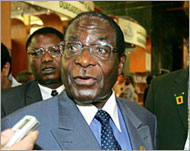World Bank traces Zimbabwe decline
Zimbabwe’s rapid economic decline over the past six years is likely unprecedented for a country not at war, says the World Bank’s director for the country.

In an interview with Reuters on Tuesday, Hartwig Schafer said reversing the decline would require major economic restructuring, similar to policies that helped rebuild former Soviet states also endowed with infrastructure and human resources.
“I can’t think of a country that has experienced such a decline in peace time,” said Schafer, blaming poor government policies.
“The major reasons for (Zimbabwe’s) decline are the breakdown of agricultural productivity and distortion of economic policies,” he said.
Government seizures of white-owned farms to redistribute them to landless blacks and allegations of vote rigging in elections have isolated Zimbabwe from the international community and prompted the country to seek aid from neighboring South Africa and China.
Distributing poverty
A recent World Bank study on Zimbabwe’s agricultural sector said the government’s land reforms had redistributed 80% of farmland and improved racial distribution of agricultural property but had increased poverty.
|
“I can’t think of a country that has experienced such a decline in peace time” Hartwig Schafer, |
The report said the land reform program coincides with deepening political and economic crisis that saw GDP shrink by more than 20% since 2000, while agriculture registered a cumulative decline of 26%.
The program’s impact on agriculture had the effect of displacing 30% of farm workers who are now destitute and living as squatters.
The report, dated 28 February and obtained by Reuters, said 70% of Zimbabwe’s 11.6 million people were living below the poverty line as per capita gross domestic product had plummeted 30% since 1999.
Decline
The report, based on a study conducted in the country in 2004, said the government’s fiscal crisis had led to a “devastating reduction” in access to social services, at a time when it was most needed, while the impact of HIV/AIDS was worsening.
Restoring agricultural productivity would be a first step to helping Zimbabwe stop its economic free fall, said Schafer. “It wouldn’t change things overnight but it would stop the economic hemorrhage and help the country get back on an upward path,” he added.
Once the mainstay of the economy, agriculture contributed 40 percent to Zimbabwe’s national exports, made up 18 percent of the gross domestic product, employed 30 percent of the formal labor force and 70 percent of the population.
The World Bank has kept its office open in Harare under a “limited engagement” strategy, but halted lending as the government fell into arrears that have now reached $353 million.
Helping Zimbabwe
By staying in the country, the World Bank is poised to help if Zimbabwe takes the necessary steps that will allow foreign aid to resume, he said.
 |
|
President Mugabe’s land redistribution |
“It’s important to stay on the ball, and (the international community) should be prepared for policy implementation that will turn the economy around,” Schafer said.
Last week, a UN report called on President Robert Mugabe to halt the demolition of urban slums that has displaced tens of thousands of people.
The government said the “Operation Restore Order” was intended to fight black market trading and other lawlessness.
Concern and criticism
Schafer said the World Bank had also expressed concern at the evictions, and new World Bank president Paul Wolfowitz called the situation “a tragedy” during a recent African trip.
Schafer said Zimbabwe’s government had tried to turn around macroeconomic policies and last year sought to rein in inflation by controlling the circulation of currency.
He said Zimbabweans had reverted to black markets to cope with rising prices and shortages of staple foods and fuel in
the formal markets.
“The population is using the parallel markets, and that is why we have the crackdowns,” he said. “The economy was functioning surprisingly well in parallel tracks, and in part this is where some of the economic policies are trying to bring the informal sector under the formal umbrella.”